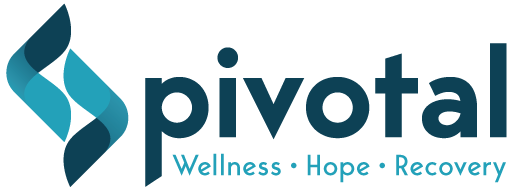Wellness, Hope, and Recovery
Adults Services
Your Wellness Matters
At Pivotal, we understand that day-to-day stress and pressure can be intensified by the complexity of today’s world resulting in depression, unusual behavior, or physical problems. When the support of family and friends just isn’t enough, professional help can be the answer.
We can help you find your strength through recovery and wellness. Our comprehensive adult programs offer a wide range of confidential services from Assertive Community Treatment (ACT) to Women's Speciality Services (WSS).

Adult Programs and Services
Adult Outpatient
Treatment activity designed to reduce maladaptive behaviors, maximize behavioral self control, or restore normalized psychological functioning, reality orientation, re-motivation, and emotional adjustment, thus enabling improved functioning and more appropriate interpersonal and social relationships. Evidence-based practices such as integrated dual disorder treatment for co-occurring disorders (IDDT\COD) and dialectical behavior therapy (DBT) are included in this coverage. Individual/group therapy is performed by a mental health profession within their scope of practice or a limited licensed master's social worker supervised by a fully licensed master's social worker.
Crisis Care
The mission of the Pivotal Crisis Intervention Services is to provide 24 hours a day, 365 days a year, access to emergency mental health screening and crisis intervention services to any individual presenting for services. Crisis intervention services provide emergency intervention services, including clinical evaluation of the problem, appropriate interventions and timely disposition to admit to inpatient care or refer to outpatient services. The Crisis Line is always available at 1-800-622-3967.
Jail Diversion Services
Jail Diversion services are required by the Michigan Mental Health Code for the purpose of identifying persons who come to the attention of the law enforcement system who may be appropriate for mental health treatment as an alternative to incarceration. Diversion from incarceration may occur before or after booking. Pre-booking diversion typically occurs in the field and is handled by a road officer and CMH emergency services worker. The result is typically hospitalization or other protective placement. Post booking diversion typically occurs after the person has been incarcerated and involved a tailored sentence negotiated by the jail diversion specialist with the prosecutor, judge and defense attorney. Post booking referrals are directed to the agency's designated jail diversion specialist.
The jail diversion specialist is also available to provide training to any persons or groups involved in the correctional system who may deal with persons with mental illness or developmental disabilities. This would include, for example, road officers, prosecutors, judges, defense attorneys, probation officers, and magistrates.
Medication Management & Psychiatric Services
Medical intervention is often needed as a part of an individual's treatment regimen. In many cases, those services can be provided by the primary care provider, such as when the psychotropic medications are fairly routine (e.g., antidepressants). In cases where an alternate prescriber is not available, or cases that are more complicated or need close coordination with other mental health services, the services are provided by Pivotal.
Older Adult & OBRA Services
OBRA is a federally mandated program that requires persons with mental illness or
developmental disability to be assessed prior to nursing home placement to ensure the placement is appropriate, and that needed services are provided during placement. OBRA includes pre-admission screening and annual resident review.
Older adult services, which are mostly provided on an outreach basis, include:
• Counseling
• Case Management
• Nursing Home Mental Health Monitoring
These services are intended for those who are 60 years of age or older, who live in
community settings but are homebound or nearly homebound. Older adult services are also available to adults of any age who resident in nursing home settings.
Peer Support Specialists
Adult Peer Support Services are delivered by individuals who have common life experiences with the people they are serving. People with mental health and or/ substance use disorders have a unique capacity to help each other based on a shared affiliation and a deep understanding of this experience. In self-help and mutual support, people offer this support, strength, and hope to their peers, which allows for personal growth, wellness promotion, and recovery.
A Certified Peer Support Specialist also known as a Certified Peer Specialist is a person with significant life-altering experience. This is also referred to as lived experience. These specialists support individuals with struggles pertaining to mental health, psychological trauma or substance use. Because of their lives experience, such persons have expertise that professional training cannot replicate. Pivotal Peer Support Specialists assist individuals in a multitude of areas to include and not be limited to employment, housing, one-on-one support, wellness groups, advance directives and more.
Adult & DD Case Management Services
Targeted Case Management is a service that assists beneficiaries to design and implement strategies for obtaining services and supports that are goal-oriented and individualized. Care includes assessment, treatment planning, linking and coordination, advocacy, and monitoring. Case management services are available for all individuals with serious mental illness who have multiple service needs, a high level of vulnerability, require access to a continuum of mental health services and/or are unable to independently access and sustain involvement with needed services.
Determination of the need for case management takes place through the assessment and person centered planning process. Justification as to whether case management is needed or not must be documented in the beneficiary's record.
Adult Community Living Supports (CLS)
Community Living Supports are used to increase or maintain personal self-sufficiency, or facilitate an individual's achievement of his/ her goals of community inclusion, participation, independence or productivity. Supports may be provided in the participant's residence or in community settings. Support includes:
- Money management
- Non-medical care
- Socialization and relationship building
- Transportation from the beneficiary's residence to community activities
- Participation in regular community activities and recreation opportunities
CLS may be provided on an individual or group basis and, depending on the needs of the individual, can involve a few hours a month or several hours per day.
Clubhouse (Affinity House) Psychosocial Rehabilitation
The Clubhouse program is appropriate for adults living with a serious mental illness who wish to participate in a structure program with staff and peers (members). Clubhouse members will identify psychosocial rehabilitative goals that can be achieved in a support and structured environment. The beneficiary must be able to participate in, and benefit from, the activities necessary to support the program and its members. The member must not have behavioral/ safety or health issues that cannot adequately be addressed in a program with a low staff-to-member ratio.
Staff and members work side-by-side to accomplish individual/ team tasks and activities necessary for the development, support, and maintenance of the clubhouse. Members have access to the clubhouse during times other than the typical 8 am - 4 pm work-ordered day, including evening, weekends, and all holidays.
Assertive Community Treatment (ACT)
ACT is a service-delivery model that provides comprehensive, locally based treatment to people with serious and persistent mental illnesses whose needs have not been met well by traditional approaches to service delivery. ACT is targeted to individuals who have the most serious symptoms of mental illness and experience the most severe difficulties with basic day-to-day functioning such as caring for basic physical needs, maintaining adequate and safe housing, and keeping themselves safe. Individual participating in ACT services receive services from a multidisciplinary team that includes mental health professionals, RN, and psychiatrist. ACT team members are trained in the areas of psychiatry, social work, nursing, substance abuse, and vocational rehabilitation. The ACT team provides these necessary services 24 hours a day, seven days a week, 365 days a year. Treatment and services may include:
- Psychopharmacologic (medication) treatment
- Individual supportive therapy
- Mobile crisis intervention
- Hospitalization
- Substance abuse treatment, including group therapy
- Behaviorally oriented skill teaching, including structuring time and handling activities of daily living
- Supported employment
- Direct support to help clients obtain legal and advocacy services, financial support, supported housing, money-management services, and transportation.
Women's Speciality Services (WFSS)
Pivotal's Women and Family Specialty Services (WFSS) program, is dedicated to empowering mothers, pregnant women, and caregivers facing challenges with substance use and/or co-occuring disorders. Through the WFSS program, we embrace unconditional care-supporting the entire family system by meeting individual's where they are and prioritizing the goals they identify as meaningful. Our approach is rooted in adaptability, ensuring that our services align with the unique needs of each family, providing personalized and compassionate support every step of the way.
All individuals who are pregnant or primary caregivers of children, and using substances are eligible for WFSS treatment, including those with a co-occurring mental health disorder, will be offered inclusive services. Services will minimally include the provision of or an arrangement for prenatal care, pediatric medical care including immunizations, therapeutic interventions for both caregiver and child(ren), transportation, and case management. Pregnant individuals requesting treatment are considered a priority for admission and must be screened and referred for services within 24 hours.

